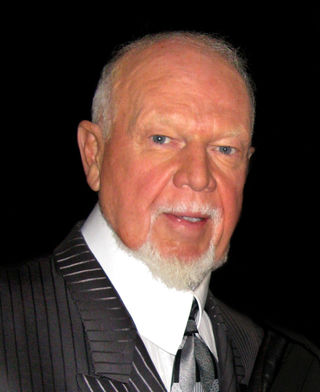Media
5 Life Lessons from Don Cherry’s Firing
Key lessons for your next conflict, brought to you by an anti-immigrant rant.
Posted November 12, 2019 Reviewed by Jessica Schrader

Full confession: I’m a Canadian man who doesn’t care about hockey. I’m living proof that stereotypes can be wrong.
This week, Canadians have been talking about a hockey story even more than usual, but the reasons are actually of interest to me. Hockey personality Don Cherry was fired from his longtime job when he ranted about immigrants not wearing red poppies on Remembrance Day, suggesting that they gain from living in Canada without supporting Canadian war veterans.
The flaws in Cherry’s claim that his comments were all about remembering war veterans are obvious: All sorts of people born in Canada, including white people whose families fought in the Canadian military, don’t wear red poppies. Many recent immigrants do wear them. Also, it’s impossible to look at someone and tell whether or not they’re a new Canadian, so when he said “you people come here” it seems as if he was thinking about non-white immigrants.
What can we learn from the Cherry situation to improve our own conflicts?
1. If you want to have a better conflict, reflect on what you’re feeling and where that feeling may be coming from. We can’t guess what Cherry’s feelings or intentions were, so it’s important not to assume that we know. But we can consider a few general trends that may or may not apply to this case. New immigrants and visible minorities are typically among the least powerful groups in any country, and are regularly the targets of both verbal and physical attacks. There are a few intriguing hints that fear and disgust may play a role here. For example, two experiments found that when we feel safer, that can increase our social acceptance of immigrants. And a survey of the so-called “alt-right” in the U.S. suggested a psychological profile filled with anxiety about white people losing their dominant position in society. Interestingly, this was much more of a concern to the survey’s respondents than were economic issues like job security.

2. When a conflict erupts, it offers us opportunities, too. Cherry’s ill-informed comments can serve as an opportunity for media not just to descend into a tired debate about free speech, but to do something more useful: encouraging learning. You can do the same in your own life. Rather than making the conflict personal or focusing only on areas of disagreement, try too to recognize where there are shared views and values. Cherry feels that he is standing up for veterans. Perhaps all sides agree that disrespecting veterans is wrong and no one is actually trying to do it. They might even agree that disrespecting immigrants is wrong too.
Try also to find gaps in knowledge and get curious, seeking out quality information. In this case, imagine if the media reported less about Cherry (already a famous figure) and what people think about his comments, and focused instead on less well-known information about immigrants. For instance, here are some facts about refugees in Canada. How much of this does Don Cherry know? How much do you know? How much do we know about the ideas behind the symbol of wearing a poppy or the different colours that people wear?
3. It’s all too easy to feel outraged. Facebook and Twitter seem to be made to boost outrage, because it hooks us in. Cherry’s comments went viral and this likely contributed to his quick firing. A campaign to boycott Rogers, the media company that Cherry worked for, quickly followed. Whether or not you agree with getting Cherry fired or boycotting Rogers, public shaming and other social media pile-ons can have seriously scary impacts.
Jumping on an outrage bandwagon might feel like a thrill, but often (although not always) it isn’t that useful if you want to have the best chance of a positive outcome in your conflicts. Instead, try to pause and speak from your own experience without making far-reaching judgments, assumptions, or calling people names. Easy to say, difficult to do. (My book includes lots of evidence-based findings on this critical topic of effective communication in conflicts. It also has exercises to practice. Practice is essential, especially since it’s easy to lose ourselves in the heat of the moment.)
4. Everyone believes they’re fighting for the right cause. One of the reasons that debates about morality tend not to be very productive is that we’re all very good at rationalizing whatever we’ve done. And punishments, like being fired, rarely change our minds. So a deeper ongoing process is also needed if we want to have more constructive conflicts. Predictably, Cherry refused to apologize and cast himself as an innocent, claiming his rant wasn’t directed at immigrants, although listening to it, it seems quite obvious that it was. Perhaps he isn’t even aware of this and is in denial, a common state documented by sociologist Stanley Cohen, who found it in all sorts of conflicts. It takes courage and self-reflection to acknowledge what happened and not go into denial. This isn’t easy for any of us, regardless of how clever we think we are.
5. What we pay attention to impacts us greatly. Isn’t all this anti-immigrant rhetoric just harmless? It appears not. When a politician gets publicity by insulting a minority, that’s not just a free expression of an opinion. Groups have tracked hate incidents increasing as an immediate result. Speech isn’t “just speech.” It changes our sense of what’s normal and acceptable. It can also inspire actions. ABC News found that, when committing crimes including assault, some people directly cited US President Donald Trump as a role model or justification. Cherry’s ideas—on immigration, poppies, or any other topic—didn’t come from nowhere. All of us exist in a particular environment where we learn what’s OK to say and do, and what isn’t. Cherry was undoubtedly influenced by what politicians and media figures are saying, and his words also have the power to influence a great many people.
Of course, this isn’t an easy issue. Censorship can be incredibly dangerous too, and there are certainly many examples of disturbing attacks on speech. But free speech, like most freedoms, has limits, and one of them is when we bump up against other people’s wellbeing. There are many forms of speech, like false advertising, perjury, slander, and libel, that courts haven’t protected. That’s because they aren’t considered to be of value and they can definitely cause harm. Also, it’s important to remember that Cherry had the chance to reach millions of viewers. That power isn’t just given to everyone freely or equally. So it’s understandable that there would be careful scrutiny of his words, given the platform he had.
The most important point here is that more constructive conflicts are possible for anyone brave enough to try. I’ve collected all kinds of scientific evidence about what tends to work, documented stories of success, and offered suggestions for what can be tested in even more contentious conflicts than this one (the pronoun conflict between Jordan Peterson and trans students, for example).




